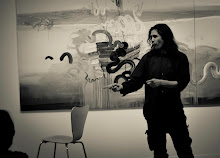At the heart of this performance is a difficult question, and a strange answer. The difficult question is simple. What is morality? What is it about a certain set of behaviours that allows us to claim that they are somehow better or different than all the rest? That somehow these actions ought to have an effect or perhaps merit a reward, beyond their immediate outcome. And does such a faith, that not all behaviour is equal, survive into a world where belief in God has collapsed?
This question has of course had many answers, and has been seen from so many different angles. And yet most of these answers have in some way sought to involve morality in a higher world, a world beyond mere natural gain. Such answers have therefore been typified by ideas of God, Duty or merely the Essence of Man. Leibniz stands out in this debate because he alone makes a somewhat startling claim. He asserts that morality is the same as materiality. That the two go together. He makes this claim, in the context of an argument about why only one world, and that being this one, exists. It alone is, he says, because somehow it is the best, is the richest, of all possible worlds, and so the one God chose to create it. What is more this choice to create this, the richest of worlds, is essentially ongoing, and we as agencies have a key part in it. For matter might be moral in that it is at all, but it is immoral in itself. It contains all possible worlds within its folds - that is, the same lump of stuff might open on many worlds, and be sword or ploughshare at different times or in different places. It is therefore us as individual agencies who by our choices usher in this world, the one that must be the best, and it is therefore our duty to remember this as we act.
Hence Leibniz is effectually arguing that the world of matter, of stuff, lays upon us, by both its existence but also its potential, the duty to be worthy of it and so of its existence. We must remember therefore that existence does not revolve around us and our particular actions or thoughts, but rather is composed of those actions through the whole of Being. What is more our position in that whole is always perilous. If we forget it, and the true power of existence, then the very matter which we think we control may elude us, and become a part in a world beyond us, one in which we have only the least of effects upon (or even interest in).
From which it follows that Leibniz's much maligned assertion, that this is the 'Best of all Possible Worlds', is not dogma or doggerel, but the evocation of a very practical empirical programme. Leibniz is suggesting that we must think and so act in the knowledge that the world is beyond us all, and that it is richer than any one of us. So that, as it is our individual actions which, taken together, create this universe (and no other), we must make those actions worthy of that whole, and so worthy of participation in every thing else, and must do so in each action, each reaction, and each moment. - An argument I find very very beautiful, and very strangely compelling; something which I hope the performance begins to communicate.


No comments:
Post a Comment